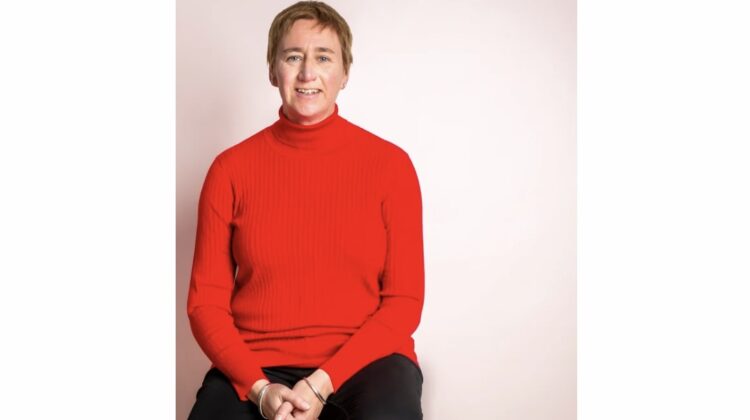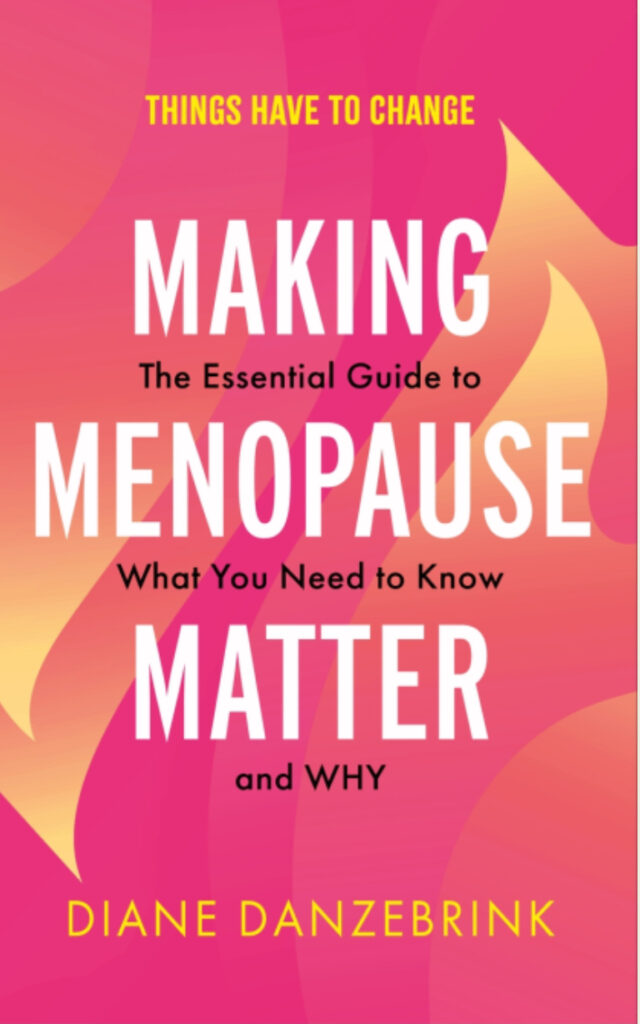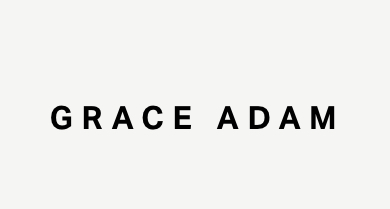
Diane Danzebrink, one of the UK’s leading campaigners for change in menopause education and awareness, will host her next pop-up event in Norwich city centre next Thursday – and then she has her first book out in May! Here, she gives an update on her campaign
National menopause campaigner Diane Danzebrink moved to Norfolk in July of last year – but has been so busy writing her first book on the subject, for one thing, that she has barely had time to explore her new home county! The founder of not-for-profit organisation Menopause Support and the UK’s #MakeMenopauseMatter campaign, who regularly appears in the national press to comment on issues relating to menopause, is also in the middle of hosting a series of pop-up information events in Norwich city centre, which will give members of the public the rare chance to talk to her in person.
Next up is an appearance in John Lewis, on Thursday March 28, which follows on from Castle Quarter and The Forum. How have the events been received so far? ‘We had a lot of interest, and a lot of people wanting to come, not just to collect information but to talk about their experiences as well.
‘At the first one, there were two young women, both under the age of 30, who were convinced they were in premature menopause and were finding it very difficult to speak to a medical health professional; then there were women who were post-menopausal – who hadn’t had a period for several years – and still struggling with symptoms. And the real highlight of the day was a lovely man who came in and said ‘I’ve come specially because I wanted to pick up some information to help me be able to support my partner’.’
Diane went through her own terrifying experience of entering instant menopause, following major abdominal surgery. ‘I think I was 44 at the time’, she recalls. ‘I had to have a hysterectomy and both of my ovaries removed at the same time and, unfortunately, I didn’t get the right information or ongoing support.
‘All I knew about menopause at the time was hot flushes. I didn’t know that there were more than 30 symptoms, and I didn’t know some of those symptoms could be psychological.’
She continues: ‘For me, that drastic loss of hormones when my ovaries were removed affected my mental health significantly to a point where I pretty much wouldn’t leave the house and I came very close to taking my own life. I’m very fortunate that I have a husband who took the right path to get me the right help and support when I really needed it, and I did see a doctor who was knowledgeable and kind and helpful, but I should’ve had all that information at the time of my surgery, not eight months afterwards when it had got to crisis point.
‘It was only when I began to feel better, and question whether it was just me who had been unlucky, that I really had my eyes opened to just how huge the issue of people not having the right help and support was – and that’s really what has defined my life for a whole decade.
‘That sort of crisis point happened to me in 2013 and it really took me many months to feel like myself, but during that time I did lots of research and was horrified at the lack of information that was out there. I’m a therapist by background and I went on to do some professional nurse training in menopause. I combined those two things and I started to specialise in counselling women who are experiencing menopause which was incredibly rewarding – but I realised it wasn’t going to make the national impact I wanted to make.
‘In 2015 I set up Menopause Support, which is a social enterprise Community Interest Company.’ The Facebook support group, alone, is a community of more than 34,500 people.
Then came the #MakeMenopauseMatter campaign, which started in 2018 and has four clear aims: to make menopause education mandatory for GPs and trainee doctors (the campaign has been influential in ensuring that menopause will form part of a women’s health module to be taught to all medical students from 2024); ensure that menopause guidance and support is freely available and promoted in every workplace (approximately 1 in 10 women leave the workplace due to menopause symptoms); add menopause education to the Relationships & Sex Education (RSE) curriculum in schools in the UK (this has been achieved); and the delivery of a government funded public health campaign for menopause.
Having campaigned for more than five years for the Government to produce a quality, freely available guide to help women navigate the menopause, Diane decided she could no longer wait and took matters into her own hands.
By July 2023 Menopause Support had published ‘Understanding Menopause – your essential guide to navigating menopause successfully’. Written by Diane’s team, reviewed by four menopause specialist clinicians, and adopted by the British Menopause Society, the 44-page booklet is factual, current and evidence based. And the PDF of the booklet is available for any organisation to access and share.
At the start of the year, the CIC launched a £90,000 fundraising appeal to produce another 250,000 copies of its booklet, after the initial 100,000 were requested and distributed UK wide in less than four months. At the pop-up event in John Lewis next week, people will have the chance to pick up a copy of the free booklet.
How is the appeal going? ‘We’ve got a very long way to go but it is a campaign for the whole year so I hope that people will recognise that we have to join together to make this stuff happen if we want to make life better for everyone around us. I think people think that Menopause Support is a huge national charity but it’s not. We have an enormous impact, but we are tiny.’
As well as the booklet, Diane has helped to create a ‘Cycle of Change’ animated video, which won silver in the ‘Longform under £100,000 Judges Award’ at the Smiley Charity Film Awards 2024.
‘That’s a co-production between myself a film company called ForMed Films and a menopause specialist called Hazel Hayden. It’s a short, five-minute film, giving people a good introduction to menopause and we are absolutely thrilled with it.’
Diane loves living in Norfolk. ‘It’s something that we had planned to do for some time, and I’ve always wanted to live close to the sea. We had spent quite a lot of time in Norfolk, in the past, and when I travel for work, which is not very often, I then turn round to come home and always think to myself, ‘fabulous, I’m going home to Norfolk.’
Whatever the day holds, she starts by walking her two Jack Russell dogs. And now she has got a little bit of downtime, she says: ‘My weekends are going to be dedicated to exploring some of the county I don’t know yet, and spending a lot of time outdoors in the summer – that’s my plan.’

But there will be the launch of her book, ‘Making Menopause Matter’ to look forward to, first. ‘I would describe it as a very honest look at the menopause landscape and how to navigate it,’ says Diane. ‘Essentially, it’s the book I wish someone had given to me, after surgery, and if it helps one person not get to the point that I got to, it will absolutely have been worth all the late nights and weekends.’
Diane and the Menopause Support stand will be located at John Lewis on Thursday March 28, located at The Balcony, between 10am and 3pm. ‘Making Menopause Matter’ will be published on May 9 (available to pre-order now via your local bookshop or online). The PDF of the Understanding Menopause booklet is available to for any organisation to access and share. You can help Fund 250,000 Menopause Information Booklets by visiting gofundme.com.







Leave a Reply